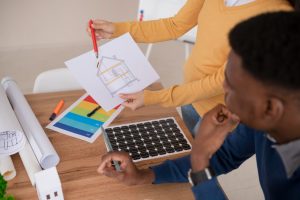Is it good to have a solar power system at home? Discover the benefits

As energy prices continue to rise and environmental concerns become more pressing, many South Africans are opting for solar power systems for their homes.
But is it really worth investing in a solar power system? In this article, we will explore the various benefits of installing a solar power system at home and the main considerations before committing to this decision.
From reduced electricity costs to increased property value, a solar power system offers several advantages that are hard to ignore.
Read to the end to find out if solar energy is the right choice for your home.
What is a solar power system?
A solar power system is a setup that uses solar panels to convert sunlight into electricity. These systems typically consist of photovoltaic (PV) panels, an inverter, batteries (optional for energy storage), and mounting structures.
When sunlight hits the PV panels, it generates direct current (DC) electricity. The inverter then converts this DC electricity into alternating current (AC), which is the type of electricity used to power household appliances.
Solar power systems can be grid-connected, off-grid, or hybrid, depending on whether they connect to the main grid or operate independently.
Each type has its own advantages and costs, but all help households reduce their reliance on conventional, often expensive, electricity sources.
South Africa, with its abundant sunlight, is an ideal environment for solar energy, making it a highly effective option for homes across the country.
Understand the main advantages of having a solar system at home
With rising electricity costs and increasing awareness of environmental issues, many South Africans are exploring sustainable energy alternatives for their homes.
One of the most popular options is solar energy, which takes advantage of South Africa’s abundant sunlight to provide clean, renewable energy. But what makes solar energy a smart choice for homeowners?
Installing a solar power system offers several benefits, from reduced electricity bills to increased property value and even long-term contributions to environmental sustainability.
Let’s delve into the most compelling benefits of having a solar power system at home and why this investment is gaining popularity across the country.
Lower electricity costs
One of the most significant benefits of a solar power system is the potential reduction in electricity costs.
South African households can save a substantial amount by generating their own energy.
With rising electricity tariffs, homeowners are increasingly looking for ways to cut monthly expenses.
Solar energy is free once the system is installed, meaning that after the initial investment, homeowners can enjoy significantly reduced or even eliminated electricity bills.
For example, a family with a well-sized system can potentially cut electricity costs by 50% or more, depending on usage patterns and system size.
This long-term savings potential makes solar energy a financially attractive option.
Low maintenance and durability
solar power systems are known for their durability and low maintenance requirements. Solar panels are built to withstand various weather conditions, including strong winds and hail.
Most systems require minimal maintenance, with periodic cleaning and an annual inspection to ensure optimal performance.
The technology used in solar panels has improved over the years, leading to a lifespan of around 25 to 30 years.
Once installed, homeowners can expect years of reliable service with minimal upkeep, making solar energy an attractive long-term solution.
Sustainability
Switching to solar energy is a powerful step toward environmental sustainability. Solar energy is clean and renewable, meaning it does not contribute to greenhouse gas emissions or pollution.
By using solar energy, homeowners reduce their carbon footprint, helping combat climate change.
This is especially important in South Africa, where much of the country’s energy is generated from coal, a major contributor to air pollution.
Adopting solar energy helps mitigate these environmental impacts, making it a sustainable choice for conscious homeowners.
Increased property value
Installing a solar power system can significantly increase property value. Homes with solar power systems are becoming more attractive to buyers, especially with rising energy prices.
Potential buyers recognize the long-term savings and sustainability benefits of a solar-powered home, making these properties more competitive in the market.
In fact, studies have shown that homes with solar installations tend to sell faster and at higher prices than those without.
Investing in a solar power system is not just about saving on electricity costs; it’s also an investment in the future resale value of the home.
What to consider before installing a solar power system
Switching to solar energy is an exciting step, but careful planning is essential to make the most of this investment.
Before installing a solar power system, homeowners need to evaluate several key factors to ensure the system meets their energy needs, fits their budget, and aligns with the structural setup of their home.
Considering aspects such as available installation space, upfront costs, roof suitability, and energy requirements will help avoid unexpected issues and maximize the benefits of solar energy.
Here’s a more detailed analysis of what you should consider making an informed decision about solar energy installation at home.
Installation space
Available space is a crucial factor when installing a solar power system. Solar panels typically need to be installed on rooftops, so assessing the size, shape, and orientation of the roof is essential.
South-facing roofs are generally the best option in the Southern Hemisphere, including South Africa, as they receive more sunlight throughout the day.
Homeowners with limited roof space may need to consider alternative options, such as ground-mounted solar panels, though these require larger outdoor areas.
Budget
While solar power systems can offer significant long-term savings, the initial investment is substantial.
Costs can vary depending on the size of the system, type of equipment, and installation fees.
In South Africa, a small residential solar installation can start at around R50,000, while larger, more comprehensive systems can cost over R150,000.
Homeowners should carefully consider their budget and possible financing options, as some banks and financial institutions offer solar loans or other customized financing solutions to make solar energy more accessible.

Solar energy audit
Conducting a solar energy audit is a recommended step before installation. This audit evaluates the home’s energy usage, identifies efficiency opportunities, and determines the appropriate size of the solar system.
By understanding how much energy the home consumes and at what times, homeowners can tailor their system to meet their needs.
This step also helps avoid overspending on an oversized system or facing limitations with an undersized one.
Roof type
The type and condition of the roof are also essential considerations. Roofs in poor condition may require repairs or reinforcement to support the weight of solar panels.
Additionally, certain roof materials may be more suitable for solar panel installation than others.
For example, metal and tile roofs are generally well-suited for solar installations, while thatched roofs may present challenges.
Checking the structural integrity and suitability of the roof for solar panels can help avoid costly repairs or replacements in the future.
How much does it cost to have solar panels at home?
The cost of a solar panel system in South Africa can vary widely depending on factors such as system size, equipment quality, and installation complexity.
- Panels and equipment: Solar panels range from R2,500 to R4,500 per panel, with the number of panels needed depending on the home’s energy needs.
- Inverters and batteries: Inverters typically cost between R8,000 and R20,000, while batteries (if included for storage) can range from R10,000 to over R50,000 each.
- Installation: Installation fees generally range between R10,000 and R20,000, depending on the complexity of the work.
On average, a complete residential solar system in South Africa can cost between R50,000 and R150,000. However, the long-term savings on electricity bills often offset the initial investment over several years.
Homeowners are advised to obtain multiple quotes from reliable suppliers to find a solution that fits their needs and budget.
Investing in a solar power system for your home in South Africa is a strategic move toward energy independence, financial savings, and environmental responsibility.
While the upfront installation costs may seem high, the benefits — such as reduced electricity bills, minimal maintenance, and increased property value — make it a worthwhile investment.
With careful planning and consideration of your home’s unique needs, solar energy can offer a sustainable and cost-effective energy solution.
Ready to make the switch to solar energy? Explore more resources and helpful guides on our site to take the next step toward a greener, energy-efficient future.
Looking for a suggestion? Check out our content explaining the seven best organization apps to simplify your life!






